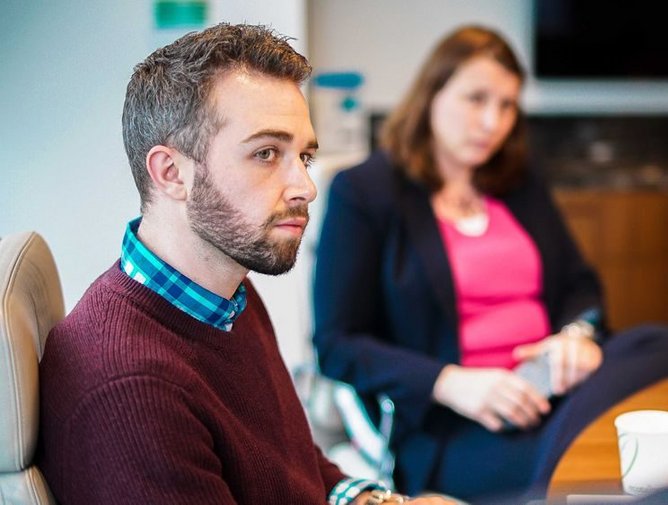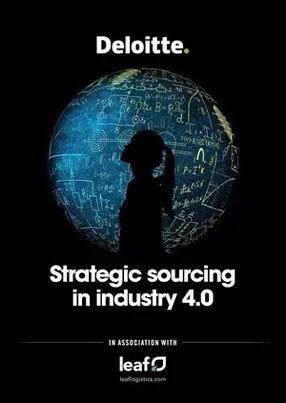Deloitte delivers next generation strategic sourcing transformation through digital analytics and diverse talent
Management consultant Natascha Schijven has witnessed the changing procurement landscape for around two decades. Now a Partner for Supply Chain & Manufacturing Operations at Deloitte, she began her career in manufacturing for a multinational packaging company in the Netherlands. Even though the local manufacturing environment was exciting, Natascha wanted to make use of a background in international business and language studies. “I wanted to make sure I would work on projects that were more complex, spanned geographies and leveraged my languages and international business background so I moved from manufacturing into strategic sourcing,” she recalls. Schijven sourced direct materials in packaging across Europe and indirects for a global specialty chemicals company, but started to feel her work lacked challenge. “At some point I got bored with the repetitive nature of my nine to five job and wanted to find something more challenging and versatile”, she says. Schijven moved into consultancy, first with A.T. Kearney and then for Deloitte. Having previously worked with consultants herself, she was ideally placed to understand the situation from both sides. “Having been on the receiving end, working with several consulting firms, allowed me to understand where the client is coming from. It’s a very different world as a client: you effectively have your own day job, plus then all of a sudden you need to manage a consultant coming in.”
Assisting some of the world’s largest organizations in Fast Moving Consumer Goods, Retail, Pharmaceuticals and Industrial Products to transform the way they source and manage costs, Schijven argues that what makes Deloitte different is the way it works as a true partner for its clients. “We are there hands on from A to Z. We’re in the trenches with you – we’re not here to tell you how to do something and then leave you to go ahead and do it,” she explains. The global consultancy’s methodology, and indeed Schijven’s experience to put herself in the clients’ shoes, has proven to resonate well with clients the world over. “It comes down to being authentic and truthful, speaking from one human to another. That helps clients not to just see consultants as guns for hire, or cyborgs coming to take jobs away from them.”
Deloitte, Schijven adds, is more than just consulting. “We have a variety of critical business lines. We have breadth and depth. We have a lot of technology empowering us and a bench strength in advanced, digital analytics that I had previously never come across. Deloitte has a whole practice built around digital and digital disruption.”
Indeed, Deloitte’s AI practice, Deloitte Omnia, is armed with next generation, disruptive solutions from Internet of Things (IoT) to Deep Learning, Machine Learning solutions and many more. “We can offer clients ways to take cost out through strategic sourcing sustainably – to accelerate time to value and truly optimize on total cost of ownership for our clients – across departmental silos. After we’ve transformed an organization, Procurement is no longer just seen as a cost cutter.”
Procurement changes
As industries become more competitive, the way procurement is viewed is indeed shifting, with businesses understanding a greater focus on cost management is needed in order to succeed: “Focus is very much shifting in the CFO space toward cost control. The world is rapidly becoming more competitive and there’s a lot of disruption fueling mergers and acquisitions. If you don’t get ahead of that, you’re not going to be able to monetize. You’ll miss the boat.
“Strategic procurement has always been one of the best ways in which you can rapidly control costs,” Schijven continues. “We’re seeing a shift from not having to worry about cost to that being the principle concern – there is less flying below the radar in high-margin environments, so you need to get it under control. The past decade or so has seen the shift from procurement being a back office, cost-cutting function, to a function that truly delivers value cross-functionally and increasingly has a seat at the C-level table.”
As the function shifts however, there will inevitably be those organizations which are further ahead, and the landscape has yet to smooth out and catch up. “It’s a journey,” says Schijven. “That’s what makes this space so interesting. You’re always pushing the envelope because you’re working with clients who are starting out in the ‘beginner’ phase, as well as clients who are absolute leaders in the space – you have to have the exhaustive content and disruptive innovation capability to show both of them how to reach the next level, and get the next double-digit cost reduction or multiple base point value enhancement.”
What is digital?
A key challenge Schijven sees procurement professionals face is the shift to digital, with one simple question on their minds: “What is digital? What is this all about? I’m hearing this buzzword flying around, but I don’t have a clue what it is. I’m Googling it and getting around 400 definitions.” According to the consultant: “The key challenges are really around how to capitalize on a world where everything is connected through different levels of technology, as well as understanding advanced analytics that allow you to harness and effectively deduce the core gist required for more accurate and accelerated decision making. That’s what’s needed to survive in the new Industry 4.0 era.”
For Schijven, then, what does digital mean? “To me, it’s all about the conversion of data into key ‘nuggets’ of information, so inherently it’s all about the analytics, harnessing the ability to have everything that used to be on paper digitized, empowering centralized cross-functional analysis. It means leveraging Big Data technology and having the latest advanced analytics get to work on all those petabytes of data to inform short-, mid-, and long-term sourcing decisions. This is how we help produce insights clients never dreamt were possible before, because all the data that was decentralized across hundreds of laptops, different enterprise systems and thousands of bits of paper is now in one centralized database or stack. That’s what it means to me.”
Looking at strategic sourcing more specifically, digital means “having everything from your PDF material and artwork specs, through to your policies, contractual and operational procurement data centralized”. “Putting statistical, optimization and other digital analytics to work within a rigorous strategic sourcing process on all that combined to rapidly produce exhaustive insights human intelligence never could – that’s how I would explain the benefits of analytics empowered strategic sourcing to a CPO,” says Schijven. In order to effectively capitalize on digital in strategic sourcing, a key priority is to have the right talent in place. “There’s a big shift in capability; the skillset required to extract value is vastly different. Next generation sourcing managers need to be trained in advanced analytics and be knowledgeable of the technologies empowering them. This is key next to other critical enablers such as transformation enabling governance and change management.”
Diversity of thought
When it comes to getting the right talent, Schijven comments: “I would advise organizations to look broadly, step outside of your comfort zone. What has surprised me is that it’s not always necessarily folks with a business or engineering background who’ve got the right stuff. I’ve been pleasantly surprised by people with completely diverse backgrounds, from microbiologists to historians. Have a healthy mix of diversely thinking people,” she advises.
Diversity of personal experience, such as having a mix of genders, will also be useful. “Women and men see things inherently differently – we’re just wired differently. Again, in the end what you should strive for is diversity of thought which is fueled by diversity across multiple dimensions; different genders, racial backgrounds, educational backgrounds, sexual orientations, etc. People who have walked life differently have different ways of viewing problems and coming up with solutions. You will not be able to build a high-performing team equipped to excel in the digital age with only engineers or only business folks. We’re all myopic because we’re all ‘molded’ to be who we are today through our gender, culture, upbringing, education and so on. Businesses should ensure a diverse pack if they don’t wish to keep coming up with the same answers.”
A well-rounded ecosystem
Another way Deloitte achieves diversity of thought is by leveraging its network of carefully selected partners – and this comes down to Schijven’s key philosophy of being authentic. “We’re never going to be everything to everybody,” she says. “If you try to run a business like that, it’s sub-optimal and it would be excruciatingly costly. Being true to yourself and saying ‘this is something we don’t do, but we have a really good partner that can offer this, and we will help drive it’ is the right way to go about it. No person or company is omniscient; being humble and self-aware enough to recognize this is key to success.”
“We have a broad range of consulting capabilities but there are always areas we don’t want to invest in or dive deep into. It’s a symbiotic ecosystem really, for example we have a network of software partners that provide the enabling, empowering technologies below some of our core capabilities. In the end, we want to authentically do what’s best for our clients so it’s critical to know which partners to work with and how best to leverage each other’s skills.”
Enabling transformation
“Some clients, and even some consultants quite frankly, believe cost transformation means a consultant comes in and like a tornado or ‘gun for hire’, goes around taking all the costs out with bare bones left and then leaves,” Schijven comments – but this isn’t the Deloitte way. “The problem with that approach is that it’s not sustainable – cost will creep back in. So, if you truly want to do strategic sourcing transformation, holistic cost transformation – or any transformation for that matter – you need to embrace the fact that it truly is a transformation. It’s not something you do to an organization; it’s something you do collaboratively with an organization. Transformation enabling change management is critical or it will not ‘stick’ and people will revert back to the way they used to do things. You need a carefully orchestrated communication and issue mitigation plan, agreed upon, visible executive sponsorship and clear transformation governance set up to help people through it. Interestingly enough many times it’s merely about treating each other as humans: actively listen with your undivided attention, repeatedly engage and communicate, involve and ask advice from those most affected. People want to be valued, acknowledged, heard and recognized.”
With this commitment to change management, Deloitte guides its clients through transformations that last – and as the importance of procurement continues to increase, this will remain key to each one of its clients. “Cost pressure is going to keep increasing,” Schijven says. “As strategic procurement is one of the key direct influencers to that cost, I believe it will gain a more important seat at the executive table – and that’s the way it should be. If you want to take control of something – not just your own costs but those of your suppliers and the full interconnected value chain, which is what we’re dealing with in a digital world – you need to empower those you put in charge with the appropriate level of decision-making authority.”



